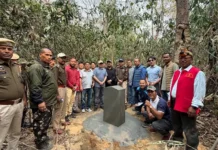[ Zilpha Modi ]
It is disheartening to see that the government of Arunachal is still not taking major steps to contain the deadly global outbreak of Covid-19. Schools and colleges are running as usual, and the markets are filled with large numbers of people. The state authorities are mostly preparing post-outbreak measures; preparing designated sites for quarantining patients, screening travellers, etc.
So far, Arunachal is lucky to have survived the Covid-19 outbreak, but it will be grossly wrong to simply wait for it to break out and then act. There have been recent reports of several positive cases in nearby Assam. Assam and Arunachal share open boundaries and people in large numbers ply every day on buses, trains, autorickshaws, Tempos, etc. It may be only a matter of time for the virus to enter Arunachal.
How well are we prepared to ensure minimum casualty in case of a large-scale outbreak? Most countries have developed a two-stage strategy – one is maximum screening, and the other is quarantine and care. Although our state seems to have taken up the same strategy, it is an open fact that, given our state’s infrastructure, we are simply incapable of handling both. Screening is ongoing only in small pockets like train stations. Public transport like buses, autorickshaws and Tempos still remain outside its purview. Second, the designated quarantine areas are mostly dilapidated, rundown government buildings. For instance, the girls’ hostel of the higher secondary school in Pasighat: not only are its surroundings unhygienic, even the provision of basic facilities like toilet and drinking water is questionable.
More importantly, who will be responsible for the care of the patients in the quarantine centres? Who will be responsible for their food, medicines, laundry, other health emergency, etc? From the current available statistics, the elderly population is the most vulnerable. Most of them already have other underlying health conditions, such as high blood pressure, diabetes, asthma etc. Will the quarantine facilities have enough qualified health workers to provide care to such patients?
Even on a normal day, there are long queues to meet the doctors in our hospitals. How are we going to deal with an epidemic with the health department already facing staff shortage? It is therefore a common fact that it is beyond the state’s infrastructural capacity to handle an outbreak of Covid-19.
My sincere request to the policymakers is that public spaces like schools, colleges and universities be shut down until the virus’ spread is contained. Also, formation of large crowds in the market areas should be discouraged. Public transport, such as buses, trains, autorickshaws, Tempos, etc, should be suspended for the time being. This may hit the local economy badly, but it may also help us save lives. We should not wait for the virus to spread and then take measures. We should focus on prevention while we still have the chance. (Zilpha Modi is an assistant professor at the Arunachal Institute of Tribal Studies, RGU, Rono Hills.)


